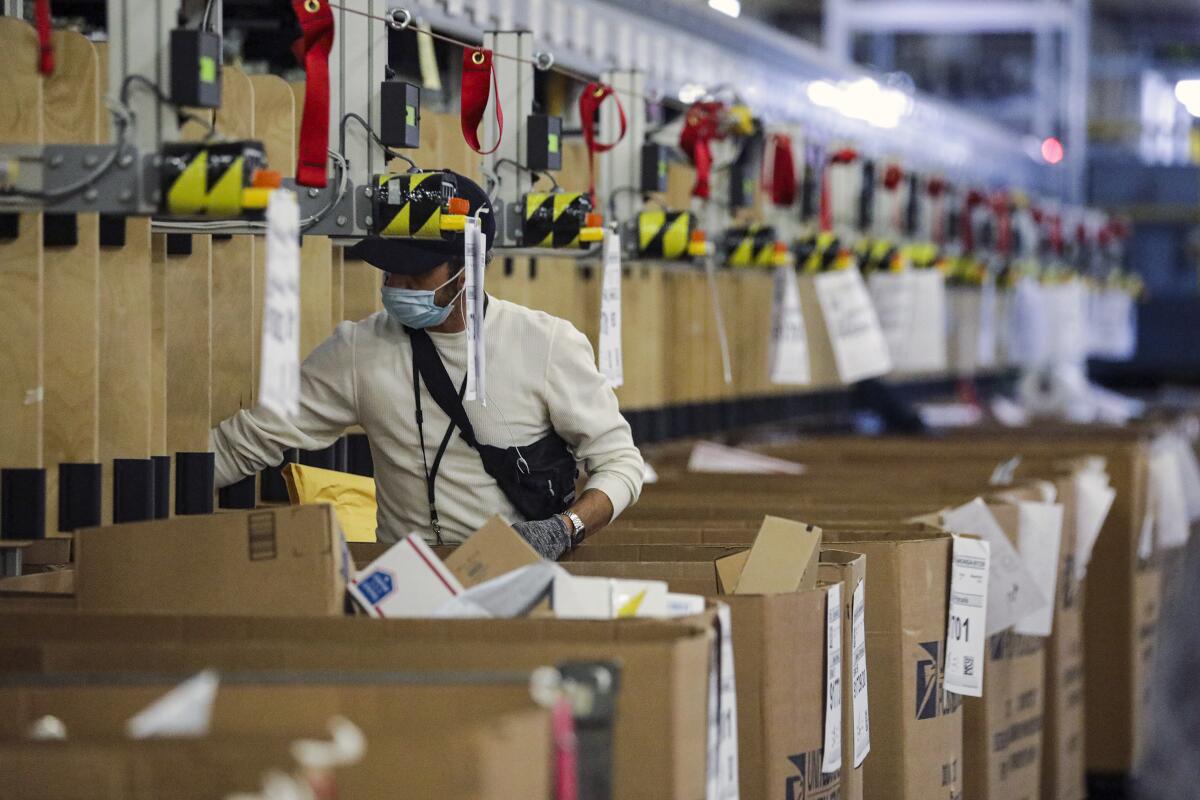Judge orders U.S. Postal Service to boost service amid concerns that late mail ballots won’t be counted

- Share via
In a last-minute move to ensure mail ballots are delivered in time for the election, a federal judge has ordered the U.S. Postal Service to rescind guidelines that slowed mail delivery over the summer and boost the numbers of late and extra truck trips.
The nationwide order from Judge Emmet G. Sullivan of the District of Columbia comes as new data show that on-time mail delivery in some parts of the country has dropped to levels lower than in July, when millions of Americans went days, even weeks, without mail. Ballots arriving late could disenfranchise thousands of voters in this election cycle in states with strict ballot deadlines, data show.
Some states with tight deadlines have seen a deterioration of on-time delivery this year, including the battleground states of Georgia, South Carolina and Florida. The Postal Service delivered 83.76% of first-class mail on time in that region in mid-July, a rate that sank to 82.69% the week of Oct. 10, according to the Postal Service. Normal performance is around 92.4%.
The Postal Service told voters in August that the agency could not guarantee on-time delivery for any ballots mailed later than the Tuesday before election day.
But Sullivan’s order Tuesday could speed up the delivery of election mail already in the system and could expedite ballots sent by voters who are dropping their votes in the mail in the final days before the deadline.
Speedier delivery could make a difference in more than a dozen states, including the battlefield states of Florida and Wisconsin, that will not count mail-in ballots that arrive later than election day. Others require that ballots be postmarked by election day and arrive soon thereafter.
Late-arriving ballots have been thrown out by the thousands in previous elections. More than 6,400 mail-in ballots were rejected in Michigan’s August primary because they arrived too late to be counted, according to the state. More than 15,000 votes were rejected in Pennsylvania for the same reason, and about 8,400 in Georgia.
California’s deadline is the nation’s most generous: As long as mail-in ballots are postmarked by election day, they can arrive as late as Nov. 20 and still be counted.
Lawsuits aimed at extending ballot deadlines have had mixed success: The 4th Circuit Court of Appeals ruled last week that North Carolina can accept mail ballots up to nine days after the election, provided they are postmarked by Nov. 3.
But a federal appeals court this month told Michigan officials that they cannot count any mail-in votes that arrive after election day. The Supreme Court made a similar call Monday in a ruling that bars Wisconsin’s elections officials from counting any mail-in ballots that arrive after 8 p.m. on election day.
Some of those areas saw dramatic drops in mail performance over the summer and still have not fully recovered. Changes made by new Postmaster Gen. Louis DeJoy in July led to chaos and delays for all types of mail, including rent payments, unemployment checks and prescription medication.
In the Detroit area, where ballots that arrive after election day will not be counted, on-time performance for first-class mail dropped 20 percentage points between January and October, according to data released by U.S. House officials Tuesday. The week of Oct. 10, about 71.6% of mail was on time.
Sullivan had issued a preliminary injunction earlier this month to stop the Postal Service from implementing its policy against late and extra truck trips and to order the agency to allow overtime so that employees can deliver election mail on time.
The move was akin to orders over the last several weeks by three other federal judges in parallel lawsuits — including one case filed by California Atty. Gen. Xavier Becerra — that sought to reverse sweeping cost-cutting measures put in place by DeJoy.
Those measures included a mandate that mail trucks leave exactly on time and that additional trips be curtailed, even if mail is left behind — a practice that ran counter to the agency’s ethos of delivering “every piece, every day.”
The plaintiffs in the D.C. case, four individual voters, argued that the Postal Service didn’t adhere to the injunctions issued by judges over the last several weeks.
Sullivan, siding with the plaintiffs, ordered the Postal Service to immediately issue a notice revoking its cost-cutting guidelines from July and to provide data on its mail delivery performance and number of late and extra trips.
Tuesday night, the Postal Service appeared to comply with one of the requirements of the order by sending a notice to employees, according to an email provided to The Times.
“USPS personnel are instructed to perform late and extra trips to the maximum extent necessary to increase on-time mail deliveries, particularly for Election Mail,” said the message, sent by Robert Cintron, vice president of logistics for the Postal Service.
More to Read
Sign up for Essential California
The most important California stories and recommendations in your inbox every morning.
You may occasionally receive promotional content from the Los Angeles Times.












